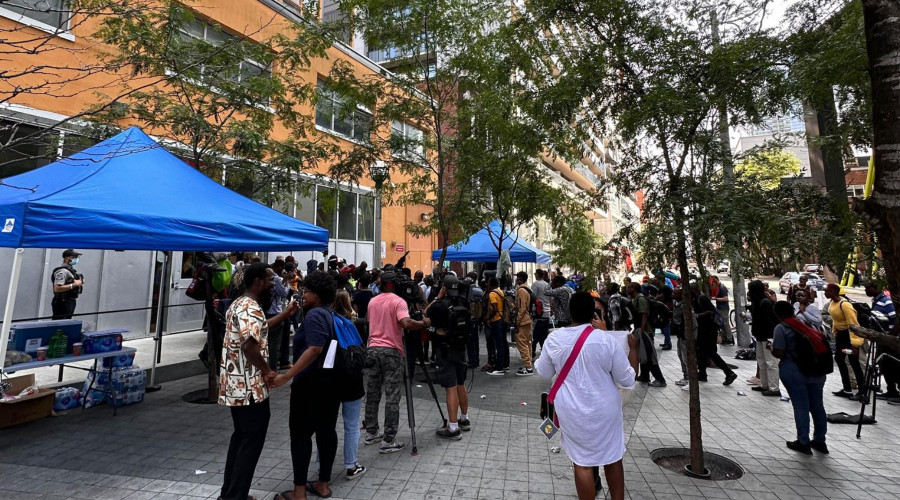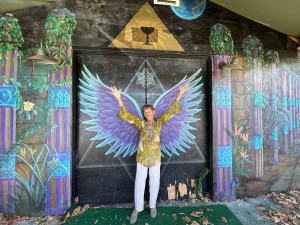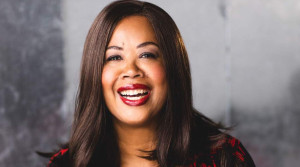The Ugandan was accepted into Canada because of her status as part of the LGBTQIA+ community, and the repressive laws in Uganda which criminalize queer relationships, including the death penalty.
“I came here at Peter St, I have been sleeping outside here for almost two weeks. I left because I am a member of the LGBT community, and they are locking us up.”
She was surrounded by other asylum seekers mainly from East Africa. They had been sent to the city shelter referral centre on Peter St. downtown Toronto, just to find out they had no room for the new arrivals, and could only offer the most basic of services. “They give us 20 minutes to use the washroom, sometimes we shower, sometimes we don’t.”
Not everyone who slept outside the shelter at 129 Peter St. was quick to talk to the media. Many of them looked tired, many seemed defeated. With nowhere to go, they sat and prayed together, waiting for any news of a place to rest. Another man who wished not to be named explained the problem:
“We called the city, and when we talked to them they said to call the federal government, but when we call them they tell us to call the city.”
Neither the city nor the Trudeau government wants to take any ownership of this issue and each prefers to blame the other. According to the federal government shelter services is an issue for provincial and municipal governments, but it is also the federal government that sets targets for immigration and refugees, making collaboration necessary. Since June 1st the asylum seekers at Peter St have been sleeping on the steps of the Assessment and Referral Centre, while they wait to find shelter.
{https://twitter.com/lorrainelamchop/status/1681482499086491649?s=20}
The Community Steps Up
On Friday, July 14th members of the African community, allies, shelter workers and others came together for a press conference to call out the government on their lack of action and also provide a platform to help these refugees get shelter. Several speakers came to express their outrage over the lack of shelter, and the anti-Black racism this country is showing to Africans.
{https://twitter.com/DrAnnLopez/status/1680954407800692737?s=20}
One of the organizers was Kizito Musabimana, director of the Rwandan Canadian Healing Centre & executive in the AfriCanadian Housing program. The housing program aims to build a physical community in Toronto around African values. An East African immigrant himself Mr. Musabimana offered a message of hope:
“I want our brothers and sisters who are here to understand, to know that there are so many people who are working so hard, so many communities across Canada, Black, white, everybody in the not-for-profits, in the shelters. Different groups have been working hard to support you. And we want you to know that we are going to continue to do that.”
He is right, while the official channels have been stuck in their ineptitude, the community is out in full force. In addition to that, many of the city's most vocal leaders have come in support of the refugees and against the failures of the federal government specifically.
Toronto journalist and activist Desmond Cole with several others has even called for the resignation of Gord Tanner, the head of the Shelter Support and Housing Administration in Toronto. But even more impressive are the ways everyday Black folk have stepped up to do anything they can. From community churches to individual do-gooders, people are trying to alleviate the pain on Peter St. One of those do-gooders is Oluranti (Olu for short). A government worker Olu is one of the many people who saw pain and wanted to do something about it:
“I don't have an organization. I just help out if there's any need. I just try to put in my little help. So the plan is to prepare dinners three times a week and give them out. So right now I'm recruiting, like asking for volunteers who are willing to join us on Mondays and Wednesdays and Fridays to prepare dinner.”
This work is what solidarity is all about. Another group of all-female, interfaith friends is trying to help these refugees too. Co-founders Adi Yemane, Ayan Kailie and True Daley are putting together meals to feed all those sleeping outside the shelter. The group is looking for volunteers between 4pm and 8pm Mondays, Wednesdays and Fridays.
Two community crisis workers Diana Chan McNally and Lorraine Lam have launched a GoFundMe which has soared over $70,000. They are using the money to provide food, water and other supplies directly to the refugees.
{https://youtu.be/ggsDr4ZBKgQ}
In the mix of informal solidarity groups like these are the larger institutions of the Black community, the church. Olu like many Nigerians is part of the church and wants to use her community to help. Lending a helping hand is part of the religious ethos and churches act as a meeting spot for people to create plans of action:
“For the welfare lead in my church, I discussed preparing what we call in Nigeria, jollof rice. So even if you can just do this only Sundays alone, we can prepare it. After church service. we go to Peter Street and deliver, if they are willing to accept us.”
It is no secret how important religious service is to the Black community. As a resource, the church has physical space, access to services and congregates to help. After the press conference, the group led by Kizito decided to take matters into their own hands. The Black solidarity group worked with Pastor Judith of Revival Times Tabernacle to graciously open her church to 200 men and women. But the church still needs help with toiletries, food and other needs.
If you or someone you know can volunteer to help them out or donate anything call Pastor Judith at (416) 254 1322.
Through the church, the community is growing its network of do-gooders in hopes of growing a movement of Africans helping Africans, from the east, west or wherever. That is not to say there are no allies from other ethnic groups working together.
{https://twitter.com/mohamadfakih8/status/1680671728928694273?s=20}
On Friday we heard speeches from people from El Salvador, India and a host of other places. Many of those in attendance, like Olu and Kizito, were immigrants too. As a social services worker Olu has seen suffering in the city, but not like this:
“It was when I actually got to social services that I understood the kind of trauma that the asylum seekers, the refugees, go through. Even with my experience working at the counter, when they come in, I'm like, oh, my God, things are not the way they used to be. The little I can do to help, I will help," says Olu.
For many of the immigrants who came in the 1990s or 2000s, the current crisis seems unbelievable. But a confluence of issues from economics, war and racism has led to our current predicament.
It took one month of Black men and women sleeping on the street for this country to even notice. The lack of coordination, care and effort is enough proof of this government's racism toward Black people. Everyone should acknowledge that anti-Black racism is part of this story, but I think it is worth being careful here because I have heard people lament about the help Afghans and Ukrainians have gotten over African refugees.
While there is no doubt that anti-Black racism is part of the government's lack of effort, posturing a narrative that pits refugees against each other for government resources is problematic.
In providing shelter for Afghans and Ukrainians, Canada was trying to rid itself of its guilt in both the Afghanistan and Ukraine Wars, two places in which they had direct involvement. This, on top of the post-pandemic wave of evictions and homelessness causing major backlogs, means shelters were always going to be full. We should be able to critically account for the government's racism without needing to put down other groups facing similar challenges. Instead, let's build bridges with communities where we share a common cause. Together with Afghans, Ukrainians and other migrant groups, we could have a bigger voice to get more shelters in Toronto. But that is a long-term solution, what we need now is for people to step up and help in any way they can.
{https://twitter.com/DesmondCole/status/1681321563805630465?s=20}
Finally, The Government Responds
Multiple outlets reported on July 19th that the federal government would give over $200 million to the Toronto shelter system to help house the African asylum seekers. This one-time injection should alleviate their immediate needs, but the issues that brought asylum seekers to our shores such as climate change, war and economic stagnation are only going to get worse.
Over the last twenty months, the number of asylum seekers in the Toronto shelter system has jumped by 500%. A one-time payment is not sustainable.
Both the government and the Black community need a system ready to handle the growing number of asylum seekers.

 By
By 


